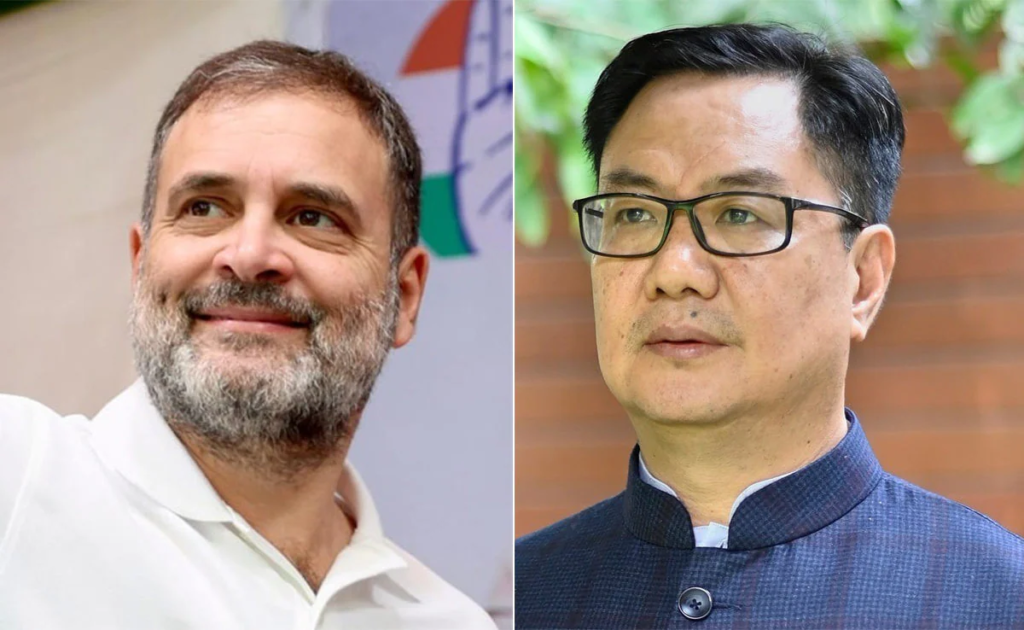Introduction: Rahul Gandhi US Visit 2024
Rahul Gandhi’s recent statements during his visit to the United States have ignited a fiery debate over India’s democratic integrity and the ongoing border tensions with China. Delivered at the National Press Club in Washington D.C. on September 10, 2024, these remarks have stirred political reactions and diplomatic discussions. This article provides an in-depth analysis of Gandhi’s comments, the responses from Indian leaders, and the broader implications for India’s international image.

Rahul Gandhi’s Critique of Indian Democracy
During his press conference in Washington, Rahul Gandhi voiced serious concerns about the state of democracy in India. He suggested that democratic values are currently under significant threat, invoking comparisons to the Emergency period of 1975 under Indira Gandhi. His remarks were aimed at highlighting what he perceives as erosion in democratic practices and civil liberties in contemporary India.
Gandhi’s statements include:
- Concerns about Civil Liberties: Gandhi claimed that the democratic framework is being undermined, drawing parallels to historical instances of autocratic rule.
- Critique of Government Actions: He criticized the current government for alleged overreach and suppression of dissent.
Union Minister Kiren Rijiju’s Counterarguments
Union Minister Kiren Rijiju responded vehemently to Gandhi’s assertions, defending the current state of democracy in India. Rijiju’s comments were intended to refute the claim that democracy is under siege. He emphasized that the era of the Emergency, marked by curtailed freedoms and suspended elections, is not reflective of the present political environment.
Key points from Rijiju’s rebuttal include:
- Historical Context: Rijiju reminded that the Emergency period was a dark chapter, but he asserts that democratic norms have been upheld since then.
- Border Dispute Clarifications: Rijiju disputed Gandhi’s claims about Chinese territorial encroachment in Ladakh, stating that historical border demarcations predate the 1962 conflict.
BJP’s Broader Critique
The BJP’s criticism of Gandhi’s remarks extended beyond Rijiju. Spokesperson Gaurav Bhatia accused Gandhi of undermining India’s global standing. Bhatia and other party members argued that making such statements abroad damages India’s reputation and could be perceived as weakening the nation’s democratic institutions.
Full Timeline of Key Events
- August 9, 2024: Rahul Gandhi arrives in the United States for public engagements and political meetings.
- September 10, 2024: Gandhi delivers a controversial press conference at the National Press Club in Washington D.C., addressing issues of democracy and the China border.
- September 11, 2024: Kiren Rijiju responds to Gandhi’s remarks, defending India’s democratic status and refuting the claims of border encroachment.
- September 11, 2024: BJP spokesperson Gaurav Bhatia criticizes Gandhi’s statements, asserting that they harm India’s global image.
Expert Opinions and Analysis
To provide a balanced perspective, we consulted experts on Indian politics and international relations:
- Dr. Anil Kumar, Political Analyst at Jawaharlal Nehru University (JNU), observed, “Rahul Gandhi’s statements reflect deep concerns but are often criticized for their timing and international context. Public figures must navigate these issues carefully to avoid providing adversaries with leverage.”
- Professor Ramesh Singh, International Relations Specialist, commented, “The border dispute with China is intricate, and public statements lacking detailed context can worsen diplomatic relations. Precision and nuance are crucial when discussing such sensitive topics.”
- Dr. Priya Sharma, Expert on Indian Democracy, noted, “While criticisms of democracy should be taken seriously, they must be contextualized within the current political landscape. It’s important for such statements to be grounded in a comprehensive understanding of the issues.”
Conclusion
The exchange between Rahul Gandhi and Kiren Rijiju underscores the intense political and diplomatic climate surrounding India’s democratic health and border disputes. As these issues continue to unfold, it is vital for all stakeholders to engage with a balanced perspective, ensuring that national interests and democratic principles are upheld.
For Regular News and Updates Follow – Sentinel eGazette
External Source Links:
FAQs
- What were Rahul Gandhi’s main concerns during his US visit?
- Rahul Gandhi expressed concerns about the state of Indian democracy and alleged Chinese encroachment in Ladakh.
- How did Kiren Rijiju respond to Gandhi’s remarks?
- Kiren Rijiju defended the current state of Indian democracy and refuted Gandhi’s claims about the China border, emphasizing historical context and current democratic norms.
- What criticism did BJP leaders have regarding Gandhi’s statements?
- BJP leaders, including Gaurav Bhatia, criticized Gandhi for allegedly weakening India’s international reputation and undermining democratic institutions through his foreign remarks.
- How has the border issue with China been described in recent statements?
- The border issue with China has been described as complex, with Gandhi’s statements about new territorial encroachments being contested by Indian officials.
- What are some expert opinions on the controversy?
- Experts suggest that Gandhi’s remarks reflect valid concerns but are criticized for their timing and context. They emphasize the need for nuanced and precise discussions on sensitive issues like democracy and border disputes.